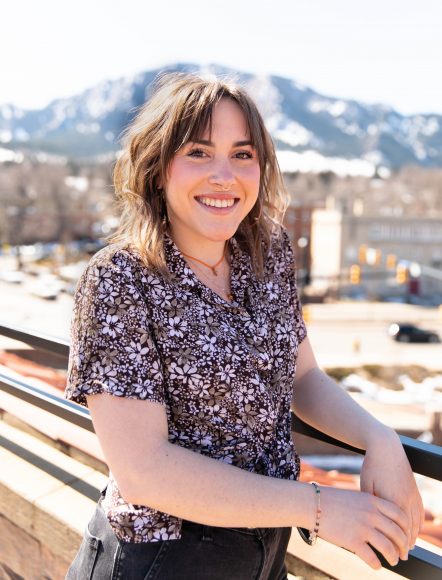
CU students and members of The Brazen Project Lily Bisantz, left, and Meiwen Liang, right, talk with students in the University Memorial Center on Friday, Feb. 28 2020. (Casey Paul/CU Independent)
On the fourth floor of the University Memorial Center (UMC) on the University of Colorado Boulder campus sits an office for a pregnancy clinic called Marisol Health, the only pregnancy clinic with offices on the CU Boulder campus. But according to members of The Brazen Project, a CU student group focused on reproductive rights, Marisol Health is a fake clinic that touts misinformation in an attempt to discourage students from pursuing abortions.
“Anti-abortion counseling centers are harmful because it promotes the ideology that women do not (or) should not have full control of their bodies and further stigmatizes abortion,” said Meiwen Liang, a CU senior majoring in anthropology who runs media and visibility for The Brazen Project. “Abortions are normal and people who decide to have one should be able to.”
The term “fake clinic” or “fake health center” has been used by pro-choice activists to refer to pregnancy clinics that “intentionally mislead women about their reproductive health-care options to block them from accessing abortion care,” according to pro-choice organization NARAL Pro-Choice America. They are also commonly referred to as crisis pregnancy centers.
Marisol Health is a women’s health clinic and initiative of Catholic Charities Denver. It exists under the broader umbrella of Marisol Services, which also includes Marisol Homes and Marisol Human Services. Along with its outreach office in the UMC, Marisol Health has two locations in Denver and Lafayette.
The CU Independent reached out to Marisol but has yet to receive a comment.

Meiwen Liang stands on the roof of the University Memorial Center on Friday, Feb. 28, 2020. (Casey Paul/CU Independent)
Liang joined The Brazen Project out of her belief in the importance of social justice and activism for young people. She learned about crisis pregnancy centers after The Brazen Project showed a video by Vice entitled “The Fake Abortion Clinics of America.”
The group has been working to spread the word about Marisol and other crisis pregnancy centers by postering around campus and hosting training sessions.
Ties to an anti-abortion network
Marisol Health is affiliated with CareNet, an anti-abortion network of pregnancy resource centers. Marisol’s Denver and Lafayette locations are two of 46 pregnancy centers in Colorado affiliated with CareNet. As of 2019, one of CareNet’s standards of affiliation is that “the pregnancy center does not perform or refer for abortion and provides a written disclaimer to this effect to clients requesting services.”
In a 2018 report entitled “Facts on Abortion,” CareNet claims that from 1973 to 2017, more than 60 million lives have been “lost to abortion.” The organization lists over 1,100 affiliated centers in the United States and Canada.
These clinics are far from limited to the Boulder-Denver area. The Guttmacher Institute estimates that 2,500 to 4,000 centers operate in the United States. End The Lies, a campaign by NARAL Pro-Choice America, has created an interactive map listing fake women’s health centers, Marisol being among them.
Claims based on ‘unproven research’
Crisis pregnancy centers often claim to have resources to reverse the effects of the abortion pill. A quick visit to Marisol Health’s website reveals a page titled “Abortion Pill Reversal,” which claims that Marisol offers services to reverse the effects of mifepristone (generically named Mifeprex and RU-486), a pill designed to terminate a pregnancy.

Lily Bisantz on the roof of the University Memorial Center on Friday, Feb. 28 2020. (Casey Paul/CU Independent)
“We know that an unplanned pregnancy can be scary and many women make decisions to abort their babies when they are terrified and stressed,” the webpage reads. It goes on to say that many women will, after some time, change their minds about having a “chemical abortion.”
“You’ll find it on almost every crisis pregnancy center website,” said Lily Bisantz, a CU sophomore and event coordinator and coalition builder for The Brazen Project.
Bisantz pointed to the American Congress of Obstetricians and Gynecologists, which has warned that the efficacy of these claims is based on “unproven, unethical research.”
“CU students who may just be needing help or are curious … need factual, unbiased information and Marisol Health is not giving (that) to them,” Bisantz said.
Despite controversy, Marisol remains registered
Marisol Health obtained an office in the UMC by applying to become a Registered Student Organization (RSO). RSOs are overseen by the Center for Student Involvement (CSI), a department of the University of Colorado Student Government (CUSG).
According to the Student Organization Handbook, one of the benefits granted to RSOs includes the “ability to apply for office/locker space within the University Memorial Center through the space allocation process governed by the UMC and CSI Boards.”
There is currently no language in the Student Organization Handbook that prevents RSOs from spreading false or misleading medical information to students.
“We want them to be able to be here and do their thing but not harm students in the process,” Bisantz said. “As a registered student organization, we also don’t have a ton of power. We’re on the same ground as Marisol Health.”
Education battles spread of misinformation
The Brazen Project works with a strong emphasis on education, with the organization hosting review-a-thons at least twice a semester wherein members leave negative reviews on Marisol’s website warning students about the dangers of the clinic’s claims.
“I think the education aspect is really important, especially since no one would go to these clinics if they actually knew what their intentions were,” Liang said.
CU graduate and former campus organizer for The Brazen Project Pablo de la Rosa said in a post on Marisol’s Facebook page that the organization is “not a comprehensive health clinic” and criticized it for supporting the idea of abortion pill reversal and allegedly suggesting a causal relationship between hormonal birth control and breast cancer during on-campus meetings.
“It is unethical and dangerous for this organization to mislead the public with medical misinformation,” de la Rosa wrote.
In response, Marisol defended its practices, writing that it is built “on the belief that women deserve respect and support to make important decisions about their sexual health or pregnancies” and stating it gives medically verified facts about procedures and birth control.
“Before Brazen, of course I cared about abortion and abortion access, but it wasn’t … very high on my priorities,” de la Rosa said later in an interview with the CUI. “Maybe I felt that as someone without a uterus, it was an issue reserved for only middle-aged white women and that I had nothing to contribute to the (reproductive) rights movement.”
What brought de la Rosa to the project was its focus on how abortion intersects with other systems of oppression such as race, class and immigration.
“In at least talking about abortion through that lens, I started feeling like I could actually participate and that this issue wasn’t as niche as I originally thought.”
Pablo de la Rosa, CU graduate and former The Brazen Project organizer
While The Brazen Project has largely focused its efforts on Marisol, another clinic alleged of spreading disinformation exists in Boulder called the Boulder Pregnancy Resource Center. Unlike Marsol, this clinic is transparent in its anti-abortion stance, writing on its website, “We promote the principle that life begins at conception.”
According to Bisantz, the Boulder Pregnancy Resource Center also appears to have adopted what NARAL Pro-Choice America calls a “co-location strategy” in which offices are placed near comprehensive health clinics or clinics that do provide abortion services.
“There’s been so many stories where someone will have an appointment with an abortion clinic and then not know which one (they) should go to,” Bisantz said. “It’s not a coincidence that it’s on the same block as the Boulder abortion clinic.”
The Brazen Project will be holding another review-a-thon after spring break as well as an informational session on crisis pregnancy centers.
“These clinics use manipulative tactics to try to get someone out of having an abortion and spread false information,” Liang said. “It’s especially harmful when (people) are already in a vulnerable state seeking this service and have to go through this process in an environment that is not supportive.”
For Liang, it’s important to let people know what they do and to and get people real resources that they need.
“And most importantly, abortion rights are human rights.”
Contact CU Independent Managing Editor Anna Haynes at anna.haynes@colorado.edu.
